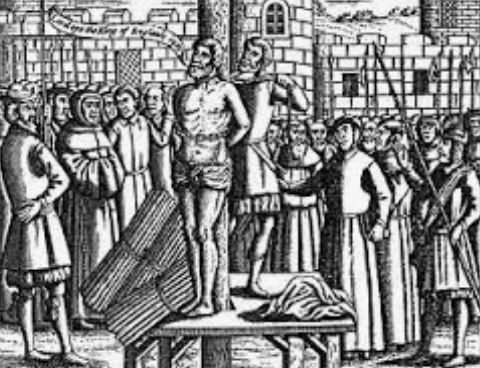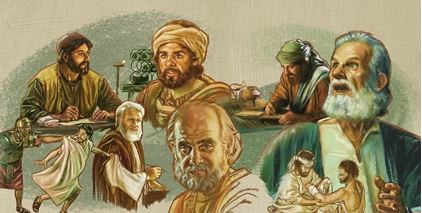Old Testament Reading – Psalm 19:1-14 – New Testament Reading – Romans 1:19-25
This I Believe…The Bible is the Word of God
“God’s Revelation of Himself to Man”
2 Timothy 3:13-17
According to recent surveys, most of the people who claim to be Christians cannot explain what they believe about God, about Christ, about the Holy Spirit, or about their salvation.
- This lack of doctrinal integrity is why so many contemporary Christians have been deceived by the devil, trapped by the trivial, and relying on their religion to get them through the issues of life, and it isn’t working.
- “Unchurched Harry” became “Easy-Believism Bob,” who joined the church, was baptized and is now involved in all the church events, but he does not understand what it means.
- If all Harry hears every Sunday is how to be saved or how to use the Word of God to make his life successful, he will never know any more about the Christian Faith than he knows now. .
- Spiritual growth cannot be achieved if every sermon must be preceded with loud, emotionally-stirring music, enhanced with dramatic lighting, and communicated in culturally sensitive phrases so as not to offend anyone.
- “The greatest weakness in the church today is that almost no one believes God invests His power in the Bible. Everyone is looking for power in a program, in a technique, in anything and everything except where God has placed it: His Word.” C. Sproul
In his first epistle, the Apostle Peter urged his readers to “Always be ready to give an answer to every man that asketh you a reason of the hope that is in you.” (1 Peter 3:15)
- Christians who attend a Bible-believing-teaching church for any length of time should have reliable answers for those who ask them honest questions.
- In Acts 2:42ff, Luke said the Apostles, who shared the gospel of salvation with those who were lost, continued to teach the Apostles Doctrine to those who were saved. So, as the Church grew numerically and geographically, it also grew spiritually.
- The spiritual weakness of today’s Church results from the pastors’ failure to preach and teach the fundamental doctrines of the Christian Faith – i.e., to “Preach the Word!”
- In the mid-18th century, under the banner of Higher Criticism, humanistic philosophy became equal with Divine Revelation, and man’s knowledge of the Bible became equated with, if not more important than, the Divine Authority of the Bible.
- The ignorance of doctrinal truth and the lack of effective evangelism through the Church today is the consequence of this paradigm shift in most seminaries.
- Since the Church rejected the Bible as absolute truth, the unbelievers rejected the Church as the pillar and ground of truth, and now many pastors do not know the truth.
- The heritage of the Christian Faith is based on our acceptance of the Bible as the divinely inspired, infallible, and inerrant Word of God; truth with no mixture of error in its content and its intent, and the final authority in matters of faith, and the practice of our faith.
- If there is to be a revival in the Church, the first step must be to return to the historic Statement of Faith regarding the Holy Scriptures and to raise the standard in our respect for and our trust in the Bible as God’s absolute Word.
- What we can know about God, about Christ, about the Holy Spirit, about heaven, about hell, or about eternity is not only contained in, but it is limited to our study of and our trust in the Bible as God’s Holy Word.
The word “Bible” comes from the Greek word “Byblos,” which means “book” – the name given to the inner bark of the papyrus tree, which was first used to make a paper-like sheet that would absorb ink without smearing the letters.
- The Bible was written over 1500 years, by 40 different authors, in 3-different languages, and yet it agrees in its content and intent, which was, and is to make man wise unto salvation, and it has one central theme from beginning to end, and that is the revelation of everlasting God to all men.
- The Bible says God has revealed Himself to man in four ways:
- Through His creation – Romans 1:19-20 – God has made the knowledge of Himself known through what He has created. Even His eternal attributes and divine nature can be seen in what He has created. If we took the time to look at the beauty and the splendor of God’s creation, we would realize if there is a design, there is evidence of a Master Designer. See Psalm 19 and Job 26.
- Through man’s conscience, heart, and mind – Romans 2:14-15 – even those who do not have God’s written word have His word written on their heart, which is why they know better than to lie, steal, cheat or murder, and feel guilty when they do wrong things. Ecclesiastes 3:11 says, God put that law in our heart to draw us to Him – a void in our heart that only He can fill.
- Through the Person of Jesus Christ – John 1:1-18 – the Bible says Jesus was with God in the beginning, that He was made flesh and dwelt among us, displaying a glory as of that of God the Father. Jesus was the living, breathing, flesh-and-blood, human presentation of the eternal God.
- Through the Word of God – The Bible is God’s written revelation of Himself to lost man. From Genesis to Revelation, the Scriptures reveal how a holy, omnipotent, omniscient God revealed Himself and His love to an unholy and unwise man, so that man could be saved from his sins and enjoy that fellowship with God forever.
- The Bible has no equal among all the writings of man in:
- Its accuracy regarding the events of human history that it covers and in the more than 300-prophecies concerning the first coming of Jesus Christ.
- Its reliability regarding its contents – there are 1,150 Old Testament original manuscripts and 24,000 New Testament original manuscripts in existence today.
- Its readability – the Bible is the best-selling book of all time, with an estimated 5 billion copies sold.
- Its authority – the Bible is unequaled in matters of faith, forgiveness, and the future.
- Its preservation – not one scientific discovery has been found to disprove what is written about God, about man, about this world, or the world to come.
1. All Scripture is Inspired by God – Vs. 16
The English word “inspired” comes from the Greek word “theopneustos,” which means “God-breathed.”
- Divine inspiration is the supernatural activity of God upon the minds of the writers so that what they wrote was the truth as it was written and would still be the truth when it was read.
- In 2 Peter 1:21, the Apostle explained this process by saying, “Holy men of old spake as they were moved by the Holy Spirit.”
- No single man or group of men would have the intelligence to fabricate such a story as the Bible tells us about God’s plan for our redemption.
- Even secular history validates the accuracy of the Bible about the Hebrew people and the Person and work of Jesus Christ.
- However, the secular writers miss the Cause behind those events as God Himself, for to do so would mean they would have to surrender their lives unto the Lordship of Christ.
- The Apostle Paul wrote this letter to Timothy at a specific time and for a particular purpose.
- However, God ordained that what Paul wrote to one pastor would become His Word to all pastors of all time.
- Therefore, when we read the Scriptures, we can see:
- How God worked in the lives of those who obeyed Him and those who did not, and know that since His ways have not changed, we can receive the same kind of blessing or consequence.
- How God worked in the lives of those who served Him, and if we follow their example, God will work the same way in our lives as He did in theirs.
- There is ONLY ONE INTERPRETATION of Scripture, and that is what the author intended when it was first written.
- Our challenge is to set the text in its context, discover the first purpose of the writing, and then discern the basic principle or the timeless truth that would apply to believers of every age.
- When the Holy Spirit moved upon Mary, she conceived and brought forth the Living Word – totally human, yet without sin.
- When the Holy Spirit moved upon the writers of the Bible, they obeyed and brought forth the Written Word – totally human, yet without error.
2. All Scripture is Profitable for Man – Vs. 15
The real purpose of the Scriptures is to make the readers “Wise unto salvation through faith which is in Christ Jesus.”
- The whole story of the Bible is God’s revelation of Himself to man and His plan for the redemption of man through the life, death, resurrection, and ascension of Jesus Christ.
- In the Old Testament, Jesus Christ is predicted
- In the Gospels, He is revealed.
- In Acts, He is preached
- In the Epistles, He is explained.
- In the Book of Revelation, He is expected.
——————————————————————————————————————————————————

William Tyndale (1494 – 1536) was a scholar and theologian who made one of the first printed translations of the Bible in English.
- Tyndale was convinced that the Bible alone should determine the practices and doctrines of the church and that all believers should be able to read the Bible in their own language.
- In 1525, the first English translation was published in Worms. By 1526, copies had been smuggled into England, where they were soon denounced as heretical and even burnt in public. Cardinal Wolsey denounced Tyndale as a heretic in 1529.
- In 1530, Tyndale wrote a treatise critical of Henry VIII’s divorce, and the furious King sought Tyndale’s extradition.
- After hiding for several years, in 1535, Tyndale was handed over to the imperial authorities in Belgium.
- After being held captive in Brussels, he was convicted of heresy. October 6, 1536, Tyndale was tied to a post, strangled to death, and his body burnt at the stake. His last words were, “Lord! Open the King of England’s eyes.”
- Four years after Tyndale’s death, King Henry VIII asked for English translations of the Bible to be published, and about 80% of the King James Bible was Tyndale’s work.
|
“I defy the Pope and all his laws. If God spare my life, ere many years, I will cause a boy who driveth a plow to know more of the Scriptures than [he does].”
William Tyndale
|







